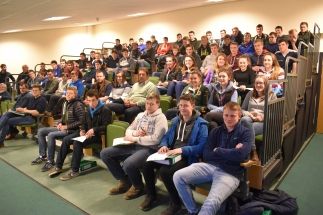- Home
- News & Industry
- Rise to the challenge of efficient production or risk being left behind
Rise to the challenge of efficient production or risk being left behind

A lively discussion on the future of the red meat sector took place at a farmer meeting hosted by Hybu Cig Cymru – Meat Promotion Wales (HCC) last week.
Over 50 lamb and beef producers gathered at Grŵp Llandrillo Menai’s Glynllifon Campus near Caernarfon to hear the views of three guest speakers on how to boost the efficiency of red meat production in Wales.
The speakers demonstrated how environmental considerations, including reducing the carbon footprint of farms, go hand in hand with efficiency targets in red meat production, leading to more profitable and sustainable businesses.
Dr Prysor Williams, a senior lecturer at Bangor University stated that the global demand for red meat will increase over time in line with a rise in the world’s population. This will place greater pressure on the livestock sector and on farmers to reach environmental targets.
“Efficiency is the key to survival,” said Dr Williams who has worked with HCC on a number of environmental and climate change projects. “Farms with a lower carbon footprint are almost always more profitable, and all producers should aim to achieve this goal. There are many Welsh farms at the top of their game – we need to move the whole sector in that direction.”
Vet Arwyn Evans of Deufor Vets also stressed the importance of efficiency to increase fertility in the beef suckler herd. He emphasised how good management practices can maximise the output of herds and lead to a greater financial return. These practices include a compact calving period of 6-10 weeks, measuring fertility, maintaining the correct body condition score for cattle, effective replacement heifer management, controlling disease that affect fertility and calf losses, and the importance of EBVs.
Speaker Alan Gardner was awarded a HCC Scholarship to visit New Zealand to look at how farmers down under maximise their returns and focus on driving their businesses forward as efficiently as possible. He was impressed by their regular use of data recording and monitoring, and noted that benchmarking methods have become standard practice in order to measure business performance year on year. He admired the willingness of farmers to share business information and decisions in order to reduce risks and the possibility of financial losses.
The audience and speakers participated in a lively discussion to close proceedings, focusing on the balance between traditional tried and tested methods and the need to innovate and apply the most efficient practices from around the world to Welsh agriculture.
Dr Williams said: “A lot of research and development work, which needs substantial investment, is required in order to further develop efficient production methods. There is huge potential in our red meat sector, and people want value and quality, we cannot afford to be left behind in this competitive market.”
HCC’s Gwawr Parry summarised HCC’s involvement in research and development projects undertaken in the industry. She said: “We were very pleased to see so many red meat producers at our ON-Farm 2017 meeting last week and enjoyed the opportunity to engage with our stakeholders and a group of 60 agriculture students at Glynllifon.
“Our guest speakers focused on efficient red meat production and benchmarking, and stressed the importance of using this data to evaluate their businesses. We hope that this is a message that farmers will adopt and implement on their own farms.”
The ON-Farm 2017 meeting was one of a series of events designed to share information and innovations that will boost the profitability and sustainability of red meat businesses.

